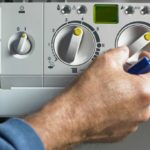Homeowners looking to upgrade their heating system or replace an aging boiler have a number of options available to them.
From traditional gas boilers to modern electric models, there are a variety of styles and features that can meet the needs of any household. But with so many different types of boilers, it can be quite difficult for new homeowners to figure out which one is best suited for their home.
In today’s article, we’ll take a look at the various types of boilers and explore the pros and cons of each type so you can make an informed decision about which one is right for your home.
Check out the following blog from Diamondback if you’d like to learn how much it costs to replace a boiler.
What Are The Different Types of Boilers and How Do They Work?
There are four primary types of boilers that are commonly found in residential spaces, including:
- Gas boilers
- Electric boilers
- Steam boilers
- Oil-fired boilers
Each type of boiler has its own set of pros and cons, so homeowners should take a moment to learn about how each of them works before committing to a purchase.
Let’s find out how each type of boiler works:
Gas Boilers
Gas boilers use natural gas or propane to heat hot water for radiators and baseboard heating systems. They can be either traditional fire-tube boilers, in which hot gasses from the burner pass through tubes submerged in water or newer condensing models that extract additional heat from exhaust gasses.
Electric Boilers
Electric boilers are powered by electricity and provide efficient heating with lower operating costs than other types of boilers. These small units require no venting and operate silently and efficiently, making them ideal for smaller living spaces such as apartments or homes without access to a conventional gas line connection.
Steam Boilers
Steam boilers use heated steam to generate warmth throughout the home via radiators and baseboard heating systems, allowing homeowners to enjoy comfortable temperatures all year round without having to raise their energy bills too much. Homeowners should note that steam systems require more maintenance than other types of boilers since they need an annual cleaning of dirt particles within the system’s pipes before operation can begin again safely each winter season.
Oil-Fired Boilers
Oil-fired boilers are cost-effective but require regular maintenance every year due to their reliance on oil to generate heat. Homeowners should note that these boilers can be noisy compared to other types and may require additional installation costs for an external oil tank and safety features such as ventilation systems.
When choosing a boiler, it’s important to consider your needs and budget before making a final decision. Homeowners should also make sure to consult with a qualified professional who can help them identify the best type of boiler for their home based on factors like size, efficiency, and cost of operation. With careful research and the right expert advice, you’ll be able to find the ideal boiler for your home in no time.
Which Type of Boiler Unit is Right for You?
Homeowners need to think about their needs and budget when choosing a boiler. They can ask for help from someone who knows about boilers so that they can decide which type of boiler is best for them. It depends on things like size, how efficient it is and the cost of using it. Doing research and getting proper advice can help you make the right choice.
At the end of the day, there is no one-size-fits-all answer to this question because every home and individual’s needs are unique. Homeowners should think carefully about which type of boiler will best meet their needs before making a final decision. With the right information and guidance, you’ll be able to find the ideal boiler for your home in no time!
In summary, homeowners need to consider their needs and budget when choosing a boiler. There are several types of boilers available on the market today—gas boilers, electric boilers, steam boilers, and oil-fired boilers—each with its own set of pros and cons.
Homeowners should take the time to understand how each type works before making a decision, as well as consult with a qualified professional who can help them identify the best boiler for their home. With careful research, you’ll be able to find the ideal boiler for your home in no time!
4 Types of Boilers: Which One Should You Get? — Conclusion
Homeowners who are looking to purchase a new boiler have several options available. From gas boilers and oil boilers to electric boilers, there is something that can fit the needs of any household. Homeowners need to consider their individual needs before making a decision on which type of boiler best suits them.
Homeowners should also take into consideration the cost-efficiency of each option when deciding what kind of boiler they want in order to get the most bang for their buck.
Ultimately, it’s up to you as a homeowner to make an informed choice about your home heating system and decide which type of boiler will work best for you and your family’s needs.
Related Posts












